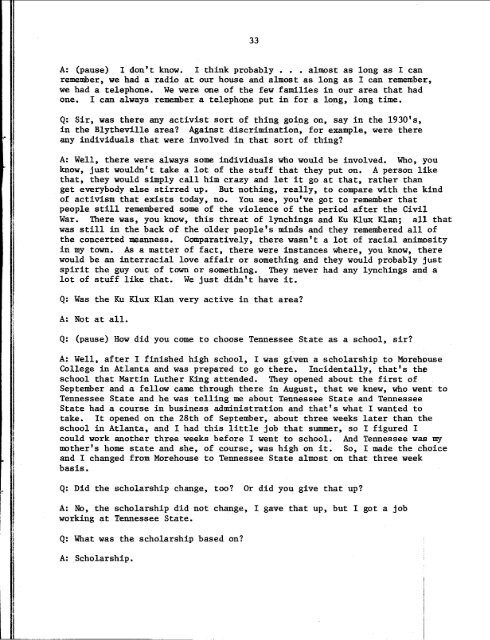Cecil A. Partee Memoir - University of Illinois Springfield
Cecil A. Partee Memoir - University of Illinois Springfield
Cecil A. Partee Memoir - University of Illinois Springfield
Create successful ePaper yourself
Turn your PDF publications into a flip-book with our unique Google optimized e-Paper software.
A: (pause) I don't know. I think probably . . . almost as long as I can<br />
remember, we had a radio at our house and almost as long as I can remember,<br />
we had a telephone. We were one <strong>of</strong> the few families in our area that had<br />
one, I can always remember a telephone put in for a long, long time.<br />
Q: Sir, was there any activist sort <strong>of</strong> thing going on, say in the 19301s,<br />
in the Blytheville area? Against discrimination, for example, were there<br />
any individuals that were involved in that sort <strong>of</strong> thing?<br />
A: Well, there were always some individuals who would be involved. Who, you<br />
know, just wouldn't take a lot <strong>of</strong> the stuff that they put on. A person like<br />
that, they would simply call him crazy and let it go at that, rather than<br />
get everybody else stirred up. But nothing, really, to compare with the kind<br />
<strong>of</strong> activism that exists today, no. You see, you've got to remember that<br />
people still remembered some <strong>of</strong> the violence <strong>of</strong> the period after the Civil<br />
War. There was, you know, this threat <strong>of</strong> lynchings and Ku Klux Klan; all that<br />
was still in the back <strong>of</strong> the older people's minds and they remembered all <strong>of</strong><br />
the concerted meanness. Comparatively, there wasn't a lot <strong>of</strong> racial animosity<br />
in my town. As a matter <strong>of</strong> fact, there were instances where, you know, there<br />
would be an interracial love affair or something and they would probably just<br />
spirit the guy out <strong>of</strong> town or something. They never had any lynchings and a<br />
lot <strong>of</strong> stuff like that. We just didn't have it.<br />
Q: Was the Ku Klux Klan very active in that area?<br />
A: Not at all.<br />
Q: (pause) How did you come to choose Tennessee State as a school, sir?<br />
A: Well, after I finished high school, I was given a scholarship to Morehouse<br />
College in Atlanta and was prepared to go there. Incidentally, that's the<br />
school that Martin Luther King attended. They opened about the first <strong>of</strong><br />
September and a fellow came through there in August, that we knew, who went to<br />
Tennessee State and he was telling me about Tennessee State and Tennessee<br />
State had a course in business administration and that's what I wanted to<br />
take. It opened on the 28th <strong>of</strong> September, about three weeks later than the<br />
school in Atlanta, and I had this little job that summer, so I figured I<br />
could work another three weeks before I went to school. And Tennessee was my<br />
mother's home state and she, <strong>of</strong> course, was high on it. So, I made the choice<br />
and I changed from Morehouse to Tennessee State almost on that three week<br />
basis.<br />
Q: Did the scholarship change, too? Or did you give that up?<br />
A: No, the scholarship did not change, I gave that up, but I got a job<br />
working at Tennessee State.<br />
Q: What was the scholarship based on?<br />
A: Scholarship.
















